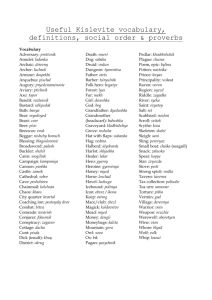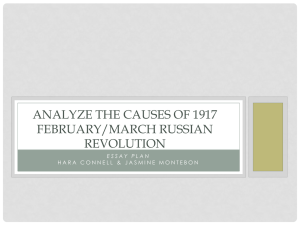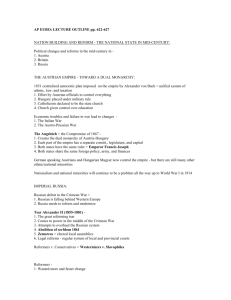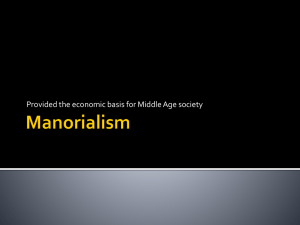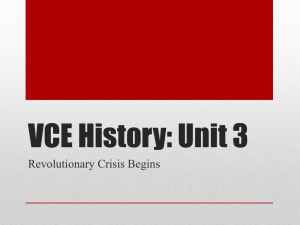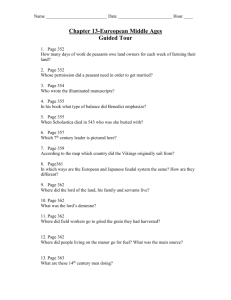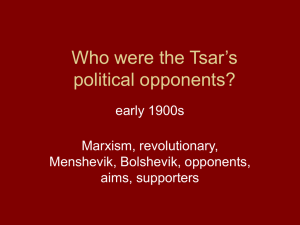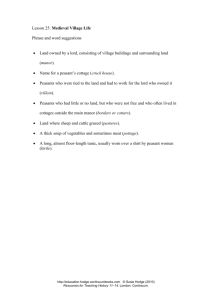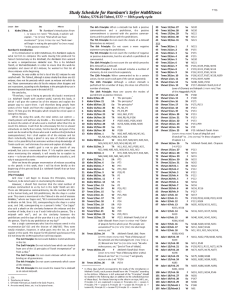Useful Kislevite phrases, expressions and proverbs
advertisement
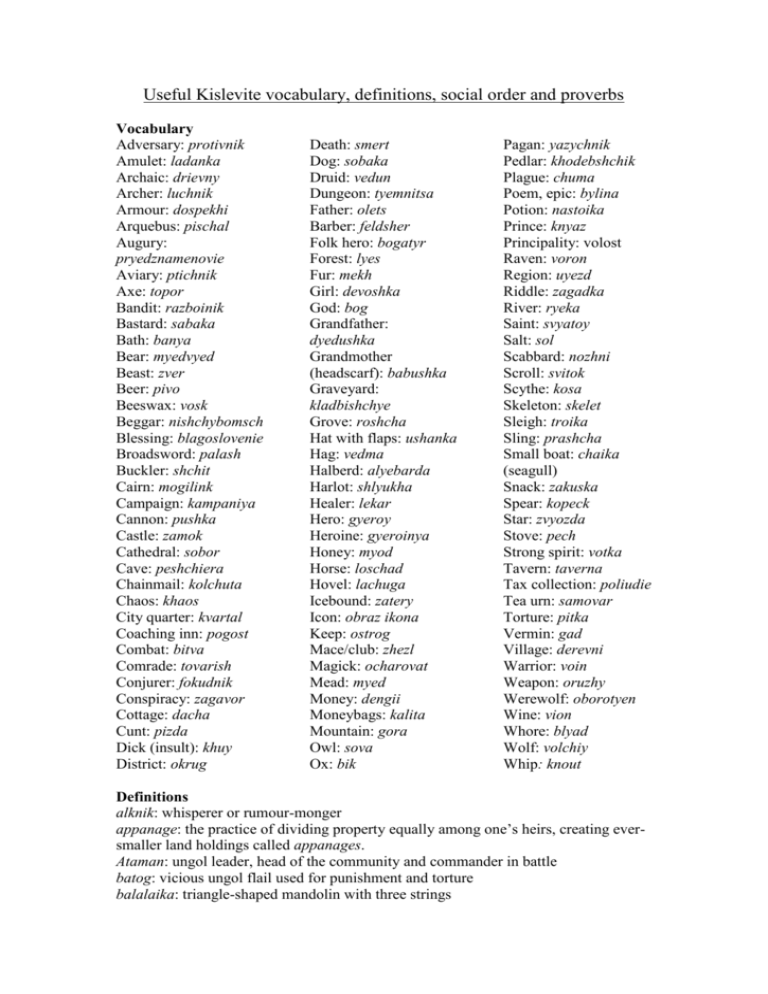
Useful Kislevite vocabulary, definitions, social order and proverbs Vocabulary Adversary: protivnik Amulet: ladanka Archaic: drievny Archer: luchnik Armour: dospekhi Arquebus: pischal Augury: pryedznamenovie Aviary: ptichnik Axe: topor Bandit: razboinik Bastard: sabaka Bath: banya Bear: myedvyed Beast: zver Beer: pivo Beeswax: vosk Beggar: nishchybomsch Blessing: blagoslovenie Broadsword: palash Buckler: shchit Cairn: mogilink Campaign: kampaniya Cannon: pushka Castle: zamok Cathedral: sobor Cave: peshchiera Chainmail: kolchuta Chaos: khaos City quarter: kvartal Coaching inn: pogost Combat: bitva Comrade: tovarish Conjurer: fokudnik Conspiracy: zagavor Cottage: dacha Cunt: pizda Dick (insult): khuy District: okrug Death: smert Dog: sobaka Druid: vedun Dungeon: tyemnitsa Father: olets Barber: feldsher Folk hero: bogatyr Forest: lyes Fur: mekh Girl: devoshka God: bog Grandfather: dyedushka Grandmother (headscarf): babushka Graveyard: kladbishchye Grove: roshcha Hat with flaps: ushanka Hag: vedma Halberd: alyebarda Harlot: shlyukha Healer: lekar Hero: gyeroy Heroine: gyeroinya Honey: myod Horse: loschad Hovel: lachuga Icebound: zatery Icon: obraz ikona Keep: ostrog Mace/club: zhezl Magick: ocharovat Mead: myed Money: dengii Moneybags: kalita Mountain: gora Owl: sova Ox: bik Pagan: yazychnik Pedlar: khodebshchik Plague: chuma Poem, epic: bylina Potion: nastoika Prince: knyaz Principality: volost Raven: voron Region: uyezd Riddle: zagadka River: ryeka Saint: svyatoy Salt: sol Scabbard: nozhni Scroll: svitok Scythe: kosa Skeleton: skelet Sleigh: troika Sling: prashcha Small boat: chaika (seagull) Snack: zakuska Spear: kopeck Star: zvyozda Stove: pech Strong spirit: votka Tavern: taverna Tax collection: poliudie Tea urn: samovar Torture: pitka Vermin: gad Village: derevni Warrior: voin Weapon: oruzhy Werewolf: oborotyen Wine: vion Whore: blyad Wolf: volchiy Whip: knout Definitions alknik: whisperer or rumour-monger appanage: the practice of dividing property equally among one’s heirs, creating eversmaller land holdings called appanages. Ataman: ungol leader, head of the community and commander in battle batog: vicious ungol flail used for punishment and torture balalaika: triangle-shaped mandolin with three strings byliny: Kislev’s legendary heroic folk songs - long and stirring Caftan: ankle-length, heavy coat (usually fur-lined) Chukhna: Norse settlers, practically a racial slur Duma: the Tsar’s inner council dvoeverie: the practice of two faiths, specifically, the persistence of traditional animist beliefs among the recent tide of the, newer, sanctioned deities golytha: colonists, usually from to the northern frontiers, usually trying to escape debt or even criminal justice Gostinnyi Dvor: Kislev’s traditional market place, now the upmarket side of town, populated by gosti, boyars and nemtsy gusli: popular stringer instrument of the lap-harp family, for many a symbol of the skomorokh izba: peasant dwelling or hovel (log house with an unheated entrance room and a single living and sleeping room heated by a clay or brick stove) kalachi: festival vendor or opportunist kartoga: penal servitude based around prison farms khazak: nomad or vagabond kvas: popular, cheap and weak beer mestnichestvo: feudal hierarchy where rank was based almost exclusively on pedigree nemtsy: a foreigner, literally “those who cannot speak” obschina: peasant communities organised around a communal form of tenue okroshka: cold soup with mixed raw vegetables and kvass pelmeni: dumpling filled with minced meat wrapped in thin dough and boiled Peklo: Land of the Dead (warm and happy afterlife) Rusalki: water nymphs, mistresses of dreaded Vodyanoy, rulers of streams and laks Schii: omnipresent cabbage stew Sbiten: hot mead, usually consumed in the winter skomorokh: traditionally a travelling minstrel or clown, increasingly priests of the Old Ways Steppe: endless windswept plains devoid of all but the occasional tree but carpeted in flowers Streltsy: town guards, literally “those who shoot” (sing. strelets) Taiga: swampy spruce forests dotted with birch and aspen stretching for hundreds of miles Troika: sleigh or wheeled carriage, drawn by three horses abreast Ungols: fierce tribes of nomadic horseman who scratch a living in the harsh Steppes Ukase: edict of the tsar or a religious leader (patriarch) Varangian Guard: Prince of Erengrad’s highly renowned personal bodyguard, composed of specially-trained Norse warriors Varangians: Norse colonisers who founded much of Kislev’s aristocracy veche: public assembly open to all free men, used to solve issues of city policy and to choose officials vedomye zheny: village wise women i.e. busybody (male=vedun) volkhv: court wizard and/or astrologer (sort of urban skomorokh) yarlik: charter granted by the Tsar to princes awarding them with the title of city-state Zalozhniy: souls of the damned (ghosts) Zemsky Sobor: Council of the Motherland, Kislev’s national assembly dominated by Kislevite boyars Zhar Ptitsa: legendary firebird Zmei: guardian dragons of the mythical Thrice-Tenth Kingdom Approximate social order kholop: a slave izgoi: a serf, bound to his master’s land zakup: an indentured servant bobyli: peasant without plowland muzhik: a peasant smerd: a “free” peasant with limited rights to travel posadnik: an elevated-form of peasant, such as a steward or miller gosti: highest ranking merchants, exempt from taxes and empowered to purchase land dyachok: priest whose duties included reading and singing konyushy: squire or “master of the horse” pomestia: recently created, service gentry, granted pomest lands after performing services to the Tsar deti boyarskie: petty nobility, literally “sons of boyars” boyars: landed aristocracy dvorianstro: highest aristocracy (usually Norse descendants) druzhyna: nobility’s legendary personal bodyguard kynaz: prince, ruler of several regions, each comprising dozens of districts Tsar: autocratic ruler of all Kislev Units of measurement Sazhen: approx 2 yards Verst: approx ½ a mile Funt: approx a pound Pud: approx 36 pounds Currency rouble: ½ Gold Crown kev: 1/10 rouble kopeck: 1/6 kev Useful words & phrases Sir / Madam: ofitsiant / ofitsiantka Hello: zdrah’stvooite I’m delighted: Ochin Preeyatna How much is that: skol’ko eto stoit I’d like: ya hochy Yes / no: da / nyet Good / bad: khoroshiy / plokhoy Big / small: blo’shoy / malen’kiy Cheap / pricey: deshoviy / dorogoy Hot / cold: goryachiy / kholodniy Old / new: stariy / noviy Open / closed: otkritiy / zakritiy Vedro: a bucket of … Bocka: a barrel of …. kuna: marten pelt (pl. kuny) veshka: squirrel pelt bela: ermine pelt grivna: bundle of pelts Please / Thank you: Puzhalsta / Spasibo Excuse me / you’re welcome: Izvineetye / Puzhalsta Where / when / how: gde / kogda / kak How long / how far: skol’ko / kak deleko Left / right: leviy / praviy Up / down: vverkh / vniz Yesterday / today / tomorrow: vchera / sevodnya / zavtra Day / week: den nedelya Month / year: mesyatz / god I do not understand: ne paneemah’yoo Health (To You): Za Vas! Proverbs A fool has no fear of going crazy. A man leaves his sins behind him, but his wife brings them into the house. All girls are darlings; where do bad wives come from? An aged horse is 10 times more useful than an aged bridegroom. Beat your wife to learn a lesson. Even a sick wolf can kill a lamb. Even a skomorokh weeps sometimes. Even the fool may ride; even the sage may walk. Fear life, not death. Fear not the clever enemy, but the foolish friend. He who does not weep in this world will weep in the next. He who is destined for the gallows will not be drowned. Hens should not pretend to be roosters. Her hair is long but her wit is short. If only one evil woman lived in Kislev, every man would want her as his wife. If the hostess is pretty, the vodka is good. If you want to find the Devil, look behind the cross. It’s a sin to leave a wedding sober. Love your neighbour, but put up a fence. Luck is better than wealth. My only hope was in a fool and then he became wise. Nobody’s seen the Devil but everyone blames him. Priests sing over the dead; mosquitoes sing over the living. Rapidly a tale is spun; with much less speed a deed is done. Save your meal for tomorrow; do your work today. The early bird that sings may wake a hungry cat. The falling leaf is a message to living men. The gods are too high; the Tsar too distant. The grave calls if you drink; the grave calls if you don’t. The icon and the axe come from the same tree. The muzhik walked to Kislev, just to hear a proverb! The temple is near but the road is icy; the tavern is far but I’ll be careful. Time is money but money is not time. We are brothers, since we have dried our rags under the same sun. When the cudgel fails, try roubles.
